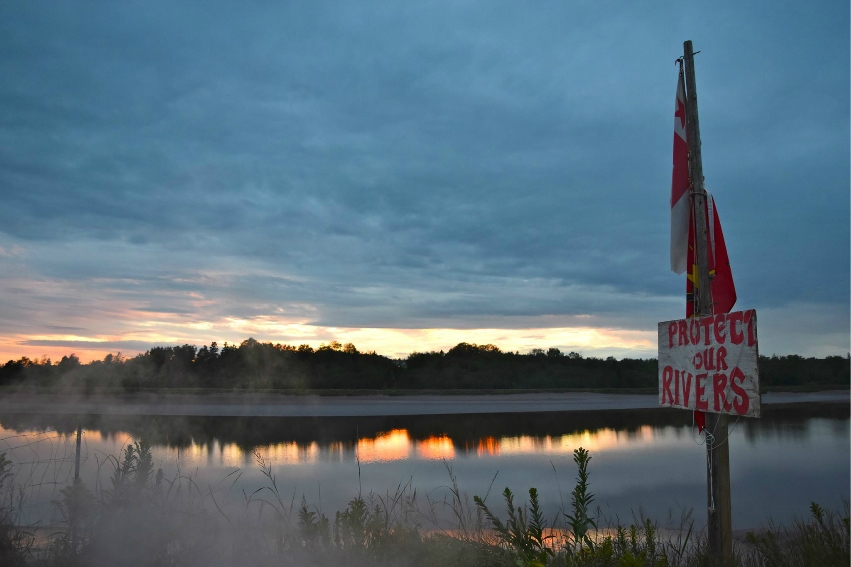
KJIPUKTUK (Halifax) – Alton Gas doesn’t have the necessary approvals to start the release of brine into the Shubenacadie River, local water protectors believe.
In a letter to environment minister Margaret Miller, Dale Poulette and Rachael Greenland-Smith claim that staff of the federal department of Environment and Climate Change Canada (ECCC) told them repeatedly that the company’s current plan to discharge brine into a channel and subsequently into the Shubenacadie River is not in compliance with federal regulations.
“He informed us that the brine is a deleterious substance. He further informed us that the company’s current plan to discharge the brine into the channel and river is in fact a release of deleterious substance and is not in compliance with federal regulations. He also advised us the company was made aware that the current design was not in compliance with federal regulations,” the letter states.
“This is about the fact that Alton Gas’ current design is not in compliance, and we’re saying that needs to come to light, and the permit needs to be suspended,” Greenland-Smith tells the Nova Scotia Advocate.
“Alton Gas gets away with saying in the media that they’re going to release the brine sometime this year, while they know they’re not in compliance. It’s disrespectful to First Nations and treaty rights. It’s disrespectful to people like Dale, who has given up three years of his life for this, and other people who have been working on this for close to five years.”
Spokespersons for the feds and the province neither confirmed nor denied what the water protectors are saying.
“The Alton Gas project is not operational, and it would not be appropriate for ECCC’s Enforcement Branch to comment on whether or not it violates the Fisheries Act. Brine could be deleterious to fresh water fish depending on the level of salinity. It is the responsibility of a project Proponent to manage its activities to prevent the deposit of a substance deleterious to fish into water frequented by fish,” writes Geneviève Groulx, ECCC spokesperson in an email to teh NS Advocate.
Similarly the provincial response.
“We expect the company to ensure that its project will be in compliance with all federal regulations and requirements. It’s up to the company to work with the federal government to ensure that happens,” writes Rachel Boomer on behalf of the department of Environment.
However, as Poulette and Greenland-Smith point out in their letter, the province still has a role to play. The provincial Industrial Approval issued to Alton Gas in 2007 makes that approval conditional on developing a salinity discharge monitoring plan in consultation with Environment Canada.
“They didn’t consult, because if they had they would have known that the brine is viewed as a deleterious substance,” says Greenland Smith. “We’re not surprised though, a year ago the provincial Auditor General slammed the department of Environment for not monitoring approval terms and conditions, and this is a fine example.”
The water protectors don’t consider any of this a victory at this time.
“It’s as if the province is doing public relations for Alton Gas, to make them look good. We know that they are probably talking to change the plan, so they can see their way around this, changing the way the brine is released. This must come to light, and be shown to the public,” says Greenland-Smith.
There’s another wrinkle.
When Judge Michael Wood dismissed a request by he Sipekne’katik Band to suspend the Alton Gas project, he suggested that Alton Gas had followed the plans and monitoring programs referred to in the Approval.
Based on their conversations with the federal bureaucrat, the Alton Gas water protectors believe that wasn’t the case.
“They should come clear to the First Nation chiefs, and to the KMKNO ( Kwilmu’kw Maw-klusuaqn Negotiation Office),” says Poulette. “It’s disrespectful.”
See emailed full responses from the provincial dept. of Environment, and from Environment and Climate Change Canada.
With a special thanks to our generous donors who make publication of the Nova Scotia Advocate possible.
Subscribe to the Nova Scotia Advocate weekly digest and never miss an article again.




That Brine water is going to kill everything, I worked with it before and it honestly peeled the skin right off of my hands and wrists like dried up shedded skin. It peeled right off and it was like stripping my hands. Cant be good!!
When the minister gives approval to a project like in the case with Alton it does not matter whether or not they ultimately fail the acute lethality test used to asses section 36 of the Fisheries Act or the “deleterious substance” provision. Brine may be deleterious however if Alton complies with the conditions of their approval then they have fulfilled the necessary legal requirements of taking all reasonable steps to prevent contravention. It is unfortunate that the radical voices get so much attention given that they clearly have little to no understanding of basic regulatory offences and laws.